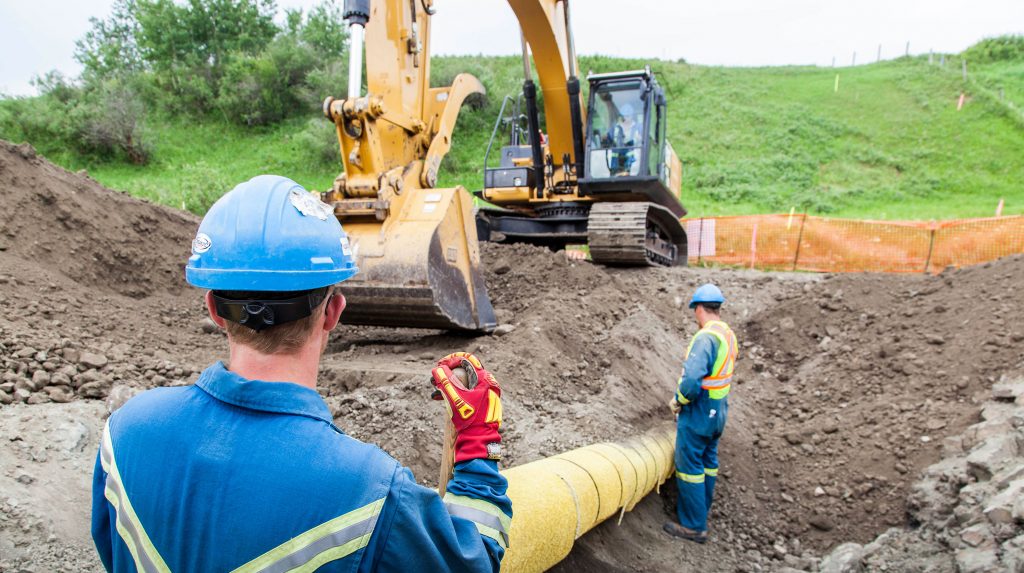The demise of Energy East, controversial tax reform and the quest for prompt payment were cited as top concerns for national construction stakeholders in 2017 in a recent year-end survey.
And underlying these topical themes was an eternal worry — how will the sector find skilled workers to get work done.
John Gamble of the Association of Consulting Engineering Companies (ACEC), Paul de Jong of the Progressive Contractors Association of Canada (PCA), Mary Van Buren of the Canadian Construction Association (CCA) and Bob Blakely of Canada’s Building Trades Unions (CBTU) offered different answers when asked what the year’s top story was for their organizations.
What we need is not more announcements, we need real dialogue. If you want to do tax reform, do it right,
— John Gamble
ACEC
CBTU COO Blakely said the October decision by TransCanada Corp. not to proceed with its $15.7-billion Energy East pipeline from Alberta to Atlantic Canada has worrisome implications not only for future investment but for stakeholders like the CBTU that have to attract new construction workers.
“The failure of Energy East is incredibly significant,” he said. “We have a system for project approvals that in my view neither inspires confidence nor does it provide a timely way for people who want to invest a ton of dough.
“TransCanada (TransCanada) spent a billion dollars to be left with a handful of papers at the end of a process that hadn’t really got started. There were many, many reasons why they didn’t build the pipeline but at least one of them was the regulatory process.”
As a result, Eastern Canada will continue to import 800,000 barrels a day paying Brent crude prices to unattractive trading partners such as Angola, Algeria and Venezuela, Blakely stated.
“It starts with a loss of jobs,” he said. “It has issues for down-the-road development. It has issues for, where the heck are we going to create the next wave of apprentices that we need so desperately?
“That is the secondary story. Baby boom generation leaves construction, leaves hole for which 248,000 people have to be found. We need to get those people before the baby boomers leave if we are going to do an adequate job on the transfer of skills and knowledge.”
PCA president and CEO de Jong also discussed the need to attract young people to the sector as he laid out his view that breakthroughs in municipal procurement in Ontario was the biggest story of the year.
Local decision-makers in Sault Ste. Marie, Waterloo and Windsor-Essex all debated whether to open up construction tendering to contractors who are not aligned with specified trade unions, with mixed outcomes, de Jong noted.
The debates in those cities were “quite significant,” said de Jong. “No labour laws are changing yet but the rallying of elected officials in different municipalities is a huge step.
“Prior to now, many municipalities only quietly acknowledged this was a challenge, but taking it into a public posture was not something they were capable of doing.”
The PCA hopes the breakthroughs will resonate nationally, he said.
As for labour recruitment, de Jong commented, “If you create artificial barriers where they can only work here and not there, whether geographically or under different labour models, that is going to drive down worker participation.”
ACEC president Gamble said the federal government’s July announcement it was planning reforms to corporate taxes roused strong pushback within his association’s membership.
“I’d have to think back quite far to recall anything that had such a grassroots reaction from the membership,” he said.
“The consequences, intended or not, had the potential to be quite devastating.”
The reforms would affect such tax planning strategies as income sprinkling and passive investing within corporations.
The ACEC joined forces with a protest movement launched by the Canadian Federation of Independent Business, and by the fall Finance Minister Bill Morneau had announced revisions to the proposed reforms.
“The government has hit the pause button to some degree,” said Gamble. “But what we need is not more announcements, we need real dialogue. If you want to do tax reform, do it right.”
New CCA president Van Buren cited breakthroughs in regulating prompter payment of invoices as the most noteworthy development in 2017 for her association. Ontario’s new Construction Act includes provisions requiring owners to pay invoices within 28 days and on the national scene, the Senate approved prompt payment provisions for federal procurement in its Bill S-224.
“The CCA has been working to educate the federal government on the importance of prompt payment and cash flow on federal construction projects and providing advice since October 2015,” said Van Buren.
She noted Ontario undertook a long process of consultation to bring about its reforms and said the next step for the CCA would be to work with the federal government to take similar steps to ensure prompt payment legislation goes through the House.
“We have been working to have an efficient consultation process much like what has been done in Ontario where it has been supported by an independent third party…and hopefully it will end up in a consensus agreement which is what happened in Ontario.
“We are hopeful that a similar process can begin in January” federally, she added.











Recent Comments
comments for this post are closed